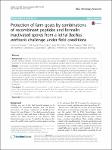Protection of farm goats by combinations of recombinant peptides and formalin inactivated spores from a lethal Bacillus anthracis challenge under field conditions
Koehler, Susanne M.
Buyuk, Fatih
Celebi, Ozgur
Demiraslan, Hayati
Doganay, Mehmet
Sahin, Mitat
Moehring, Jens
Ndumnego, Okechukwu C.
Otlu, Salih
Heerden, Henriette van
Beyer, Wolfgang
Background: Bacillus (B.) anthracis, the causal agent of anthrax, is effectively controlled by the Sterne live spore vaccine (34F2) in animals. However, live spore vaccines are not suitable for simultaneous vaccination and antibiotic treatment of animals being at risk of infection in an outbreak situation. Non-living vaccines could close this gap. Results: In this study a combination of recombinant protective antigen and recombinant Bacillus collagen-like antigen (rBclA) with or without formalin inactivated spores (FIS), targeted at raising an immune response against both the toxins and the spore of B. anthracis, was tested for immunogenicity and protectiveness in goats. Two groups of goats received from local farmers of the Kars region of Turkey were immunized thrice in three weeks intervals and challenged together with non-vaccinated controls with virulent B. anthracis, four weeks after last immunization. In spite of low or none measurable toxin neutralizing antibodies and a surprisingly low immune response to the rBclA, 80% of the goats receiving the complete vaccine were protected against a lethal challenge. Moreover, the course of antibody responses indicates that a two-step vaccination schedule could be sufficient for protection. Conclusion: The combination of recombinant protein antigens and FIS induces a protective immune response in goats. The non-living nature of this vaccine would allow for a concomitant antibiotic treatment and vaccination procedure. Further studies should clarify how this vaccine candidate performs in a post infection scenario controlled by antibiotics.
No license information

